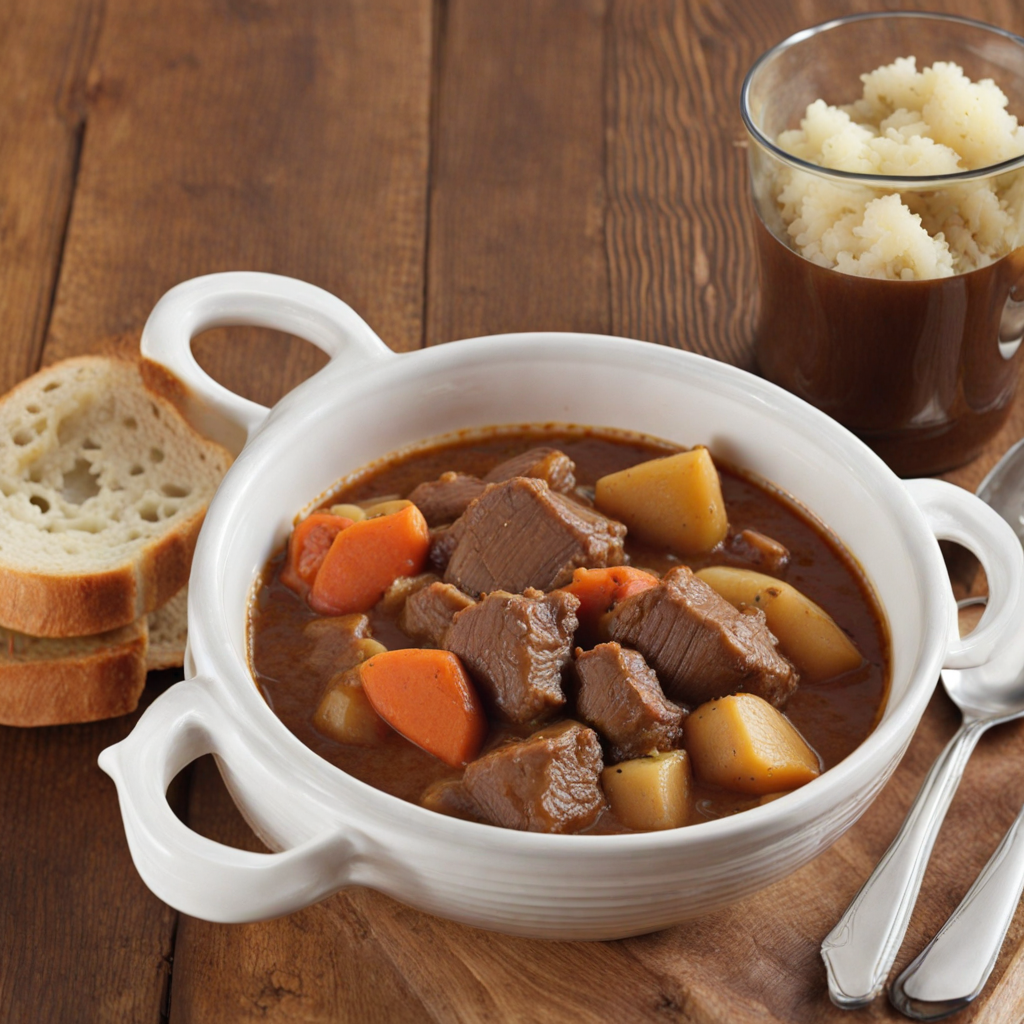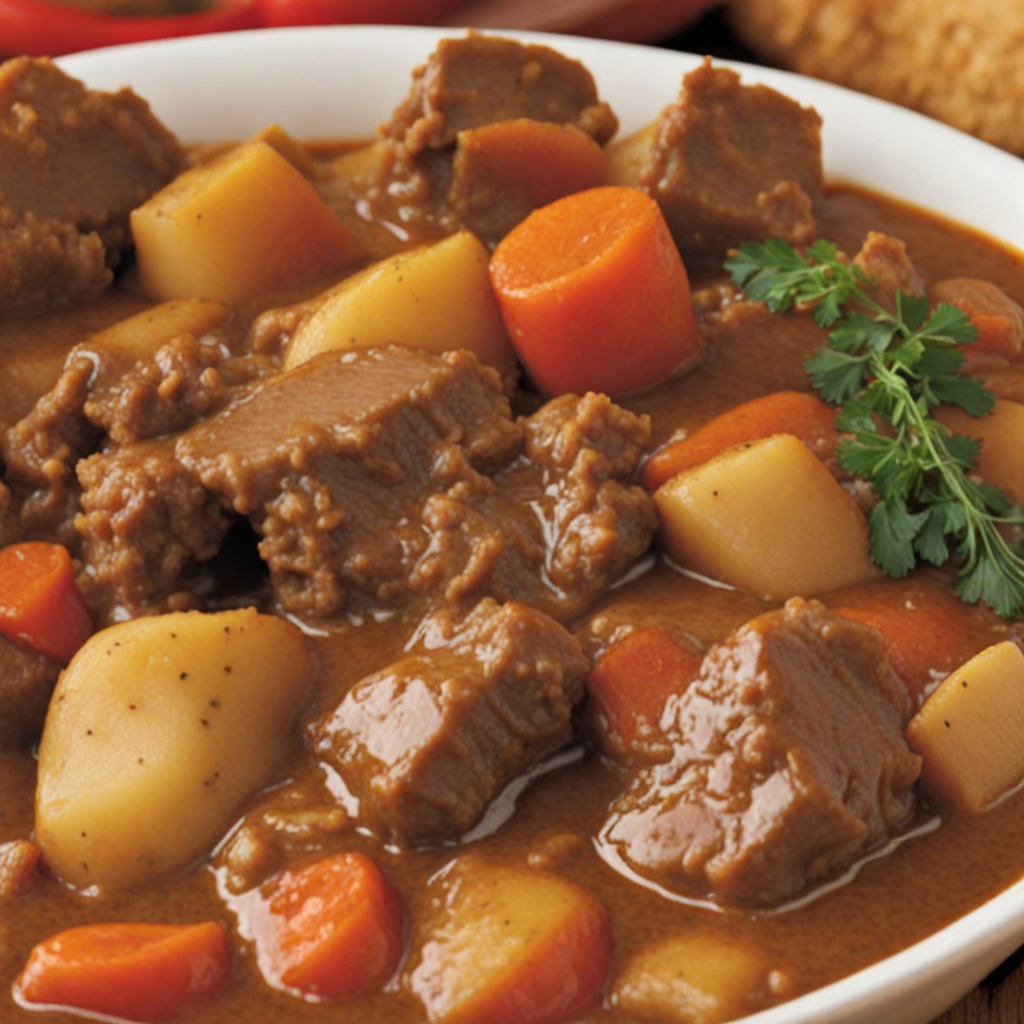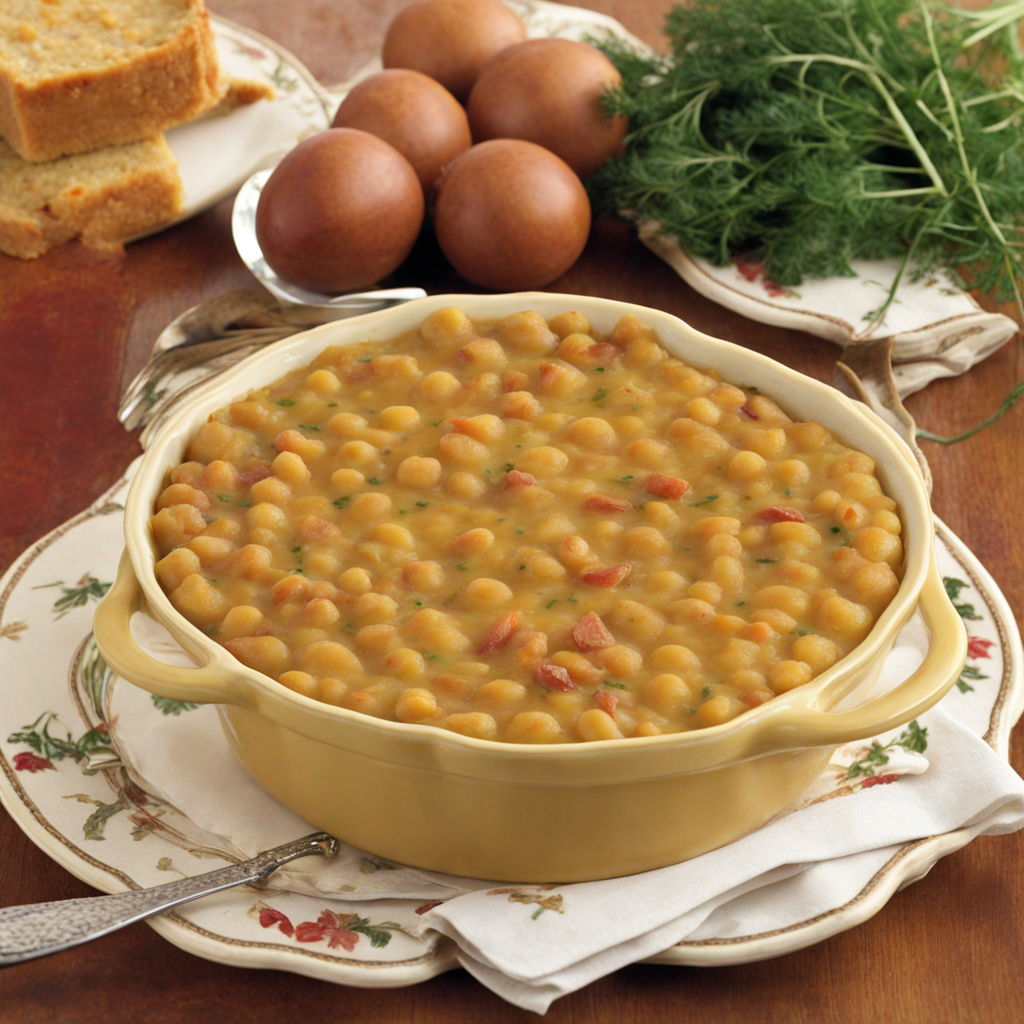Scouse
Scouse is a hearty and comforting stew that hails from the vibrant city of Liverpool in the United Kingdom. Traditionally, it is made with a combination of meat, typically beef or lamb, and a medley of root vegetables such as potatoes, carrots, and onions. The dish is slow-cooked to perfection, allowing the flavors to meld beautifully, resulting in a rich and savory broth that warms the soul. Scouse is often associated with the working-class community, embodying the spirit of resilience and resourcefulness, as it was originally a way to use leftover ingredients to create a filling meal. The flavor profile of Scouse is defined by its simplicity and heartiness. The meat becomes tender and succulent, while the vegetables add a natural sweetness and texture to the dish. Seasonings such as salt, pepper, and occasionally herbs like thyme or bay leaves enhance the dish without overwhelming its primary ingredients. As it cooks, the aromas fill the kitchen, evoking a sense of nostalgia and home-cooked comfort. It's not uncommon for a splash of Worcestershire sauce to be added, providing a subtle tang that elevates the overall taste. Typically served with crusty bread or a buttered roll, Scouse is a communal dish that brings people together, often enjoyed during cold winter months or at family gatherings. Variations of Scouse exist, with some opting for a tomato-based version or adding different vegetables depending on personal preference. For those looking to explore traditional British fare, Scouse is a delicious representation of regional cuisine that offers a warm, filling experience, perfect for anyone eager to discover a new and satisfying taste.
How It Became This Dish
Scouse: A Culinary Journey through Liverpool’s Heart Scouse, a rich and hearty stew synonymous with Liverpool, is not just a dish but a cultural emblem for the city's inhabitants. Its history reflects the diverse influences that have shaped Liverpool, a port city that has long served as a melting pot of cultures, peoples, and traditions. To truly understand Scouse, we must explore its origins, cultural significance, and how it has evolved over time. #### Origins of Scouse The dish’s name is derived from “lobscouse,” a term used in the 19th century to describe a sailor's stew, which was prevalent among seafaring communities. The word “lob” refers to a type of stew or broth, and “scouse” emerged as a colloquial term that reflected the dish's maritime roots. The maritime history of Liverpool, which became one of the most important ports during the Industrial Revolution, played a crucial role in the development of Scouse. Sailors, immigrants, and dock workers brought with them various culinary influences, resulting in a dish that was simple to prepare but rich in flavor. Scouse is characterized by its use of readily available ingredients, often reflecting the working-class ethos of the city. Traditionally, it is made with meat (usually beef or lamb), potatoes, carrots, and onions, simmered together to create a thick, comforting stew. The dish’s simplicity is a testament to the resourcefulness of those who prepared it, particularly during hard times when food scarcity was a reality for many. #### Cultural Significance Scouse is more than just a meal; it is a cultural symbol of Liverpool and its people. For many Liverpudlians, having a bowl of Scouse evokes feelings of home, community, and heritage. The dish gained popularity in the late 19th and early 20th centuries, particularly among the working-class families who relied on its nourishing qualities to sustain them through long working hours. Scouse is often associated with the Liverpool football culture, where it is commonly enjoyed by fans before or after a match, further embedding it within the city’s social fabric. The dish is also linked to the identity of the Scousers—an affectionate term for Liverpool's residents. The term itself has evolved over the years, initially used pejoratively by outsiders, but later embraced with pride. Scouse, as a food, embodies the spirit of the city: resilient, hearty, and welcoming. It symbolizes the shared experiences of families across generations, often passed down through home-cooked recipes that hold personal significance. #### Scouse Through the Ages As the 20th century unfolded, Scouse evolved alongside Liverpool itself. The aftermath of World War II brought significant changes to the city and its culinary landscape. With rationing still in place and a focus on frugality, Scouse adapted to incorporate whatever ingredients were available. This adaptability ensured that it remained a staple in many households, even as the economy fluctuated. In the late 20th century, as Liverpool faced economic challenges, Scouse became a symbol of the city’s resilience. Amidst the struggles of the 1980s, when unemployment rates soared and the city underwent significant socio-economic changes, Scouse persisted as a comfort food, reminding residents of their roots and the enduring strength of their community. During this time, Scouse also began to gain recognition beyond Liverpool. Chefs and food enthusiasts from outside the region started to embrace this humble dish, showcasing its potential in contemporary cuisine. This interest led to variations of the traditional recipe, with chefs experimenting with different meats, vegetables, and spices, reflecting a broader culinary trend that sought to celebrate regional dishes. #### Modern Interpretations and Global Influence In recent years, Scouse has seen a renaissance as chefs and home cooks alike have sought to elevate this traditional dish. The rise of food culture and the emphasis on local ingredients have allowed Scouse to be reinterpreted in innovative ways. Restaurants in Liverpool now offer gourmet versions of the classic stew, incorporating local produce and artisanal techniques while paying homage to the dish’s humble origins. Furthermore, Scouse has found its way onto international menus, showcasing the global appreciation for comfort food that tells a story of place and identity. Food festivals and events in Liverpool often celebrate Scouse, featuring competitions and tastings that highlight both traditional recipes and modern twists. #### Scouse Today Today, Scouse remains deeply rooted in Liverpool’s culture. It is often served in homes and at community gatherings, and it continues to be a dish that brings people together. The annual Liverpool Food and Drink Festival often features Scouse as a highlight, reflecting its enduring popularity. In recent years, the Liverpool community has also embraced its culinary heritage as a way to promote tourism, with Scouse becoming a symbol of the city’s identity. Culinary tours and experiences centered around Scouse provide visitors with a glimpse into the heart of Liverpool’s culture, allowing them to connect with the city’s history through its food. #### Conclusion Scouse is a dish that tells a story—of a city, its people, and their resilience in the face of adversity. From its maritime roots to its status as a beloved comfort food, Scouse embodies the spirit of Liverpool. It is a dish that transcends generations, connecting families and communities through shared meals and memories. As Liverpool continues to evolve, Scouse remains a steadfast symbol of its rich cultural heritage, reminding us of the power of food to bring people together and to nurture the soul. Whether enjoyed in a cozy home or celebrated at a grand festival, Scouse will always hold a special place in the hearts of those who call Liverpool home.
You may like
Discover local flavors from United Kingdom







